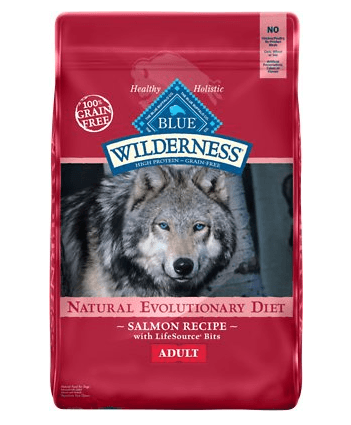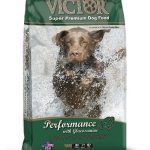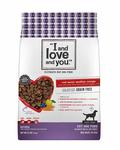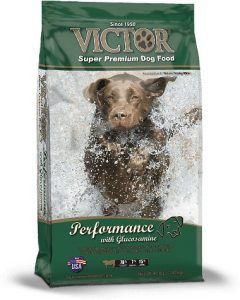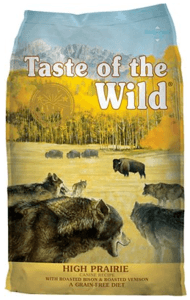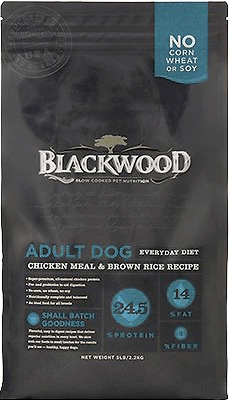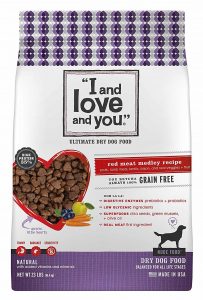Best Dog Food for Rottweilers (Plus Pros & Cons of the Best Options)
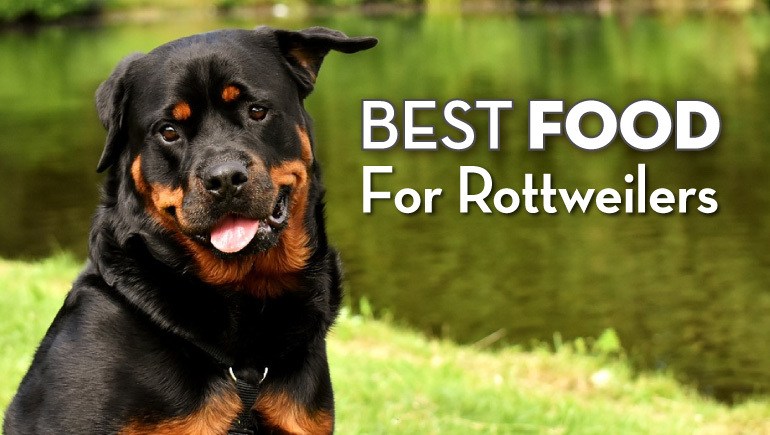
Rottweilers are big ol’ dogs, and they've got big appetites to match.
And that means it can be tough to find a food that meets all of their nutritional needs.
We'll give you the lowdown on this in a bit...
We chatted with several dog experts and Rottweiler enthusiasts to figure out exactly what these gentle giants need from their diet.
Scroll down for our top kibble recommendations...
Comparison of the Best Dog Food for Rottweilers
**Below, you'll find our expert's science-backed reviews, but you can also click the links above to see current prices or read customer reviews on Chewy.
We recommend Blue Buffalo quite a bit, and we especially like this formula for big dogs like Rottweilers.
One of the reasons it’s so good for this breed is the high protein content. Roughly 40% of this dog food comes from protein, which isn’t super extreme, but it’s still really high. And it’s certainly enough to keep your pup pumped up.
Plus, the ingredients are just really solid.
Most of the protein comes from chicken, chicken meal and turkey meal, all of which are great sources of protein.
The carbohydrate content isn’t too high, and the carbohydrates come mostly from potatoes instead of grains (although they come from white potatoes and not sweet potatoes).
It also includes some good produce, such as apples, blackberries, spinach, pumpkin, parsley and kelp… and a lot more. This is one of the things we like most about this food: it has a really, really well-balanced nutritional profile, which is one of the things we’re looking for.
Why it’s good for Rottweilers:
It’s got lots of protein, tons of produce, lots of sources of nutrients.
You may not like:
The carbs come from white potatoes, which digest quickly, and it contains small amounts of a few ingredients you may not like: tomato pomace, alfalfa meal, caramel and dried yeast.
We've always been impressed by this dog food.
Not only did our dog absolutely love this stuff, but it’s chock-full of great ingredients, and it has strong nutritional profile.
Most of the protein comes from beef and poultry, and that accounts for around 39% of the total dry matter in the dog food, which is really great. This recipe also includes pork, another good, concentrated source of protein.
What we really like, though, is that it's grain-free. You won't find any wheat or corn here. It also has glucosamine and Omega-3, which keep joints healthy and coats shiny.
One of the few downsides of this food is that it doesn’t really have the crazy, variety of produce as some of the others on this list. The lack of leafy greens and berries is pretty conspicuous.
Still, there’s a lot of protein here, and the quality is really high.
It’s good for Rottweilers because:
The quality of ingredients is really high, it’s got lots of protein, and it tastes great.
You may not like:
There’s not a lot of veggies here, and there are no leafy greens. It also contains some ingredients people tend to avoid.
This food has some pretty "wild" and exotic game meats. Your rottweilers taste for quality proteins will surely be satisfied with all the bison, buffalo, and even venison in this kibble -- all wonderful lean proteins!
There are also great quality slow-burn carbs here, like sweet potatoes and peas. You won't have to worry about weight-gain here.
Plus, there's a good mix of fruits and vegetables here, with some chicory root and nice prebiotics thrown in.
Overall, this is a great food and we heartily recommend it. Oh, and our dog loved it.
Why it’s a good choice for this breed:
It contains plenty of good quality protein, complex carbs, prebiotics, and produce.
Possible downsides:
Contains fish meal which your dog might be allergic to.
This is a good, solid dog food with plenty of meat and a lot of good fats.
Most of the protein (which accounts for about 37% of the dog food) comes from chicken meal and herring meal, although it also contains egg.
You’ll also be able to see that there are some good carbohydrates here, but they come from brown rice, which may not be the best option for dogs avoiding grains.
Lastly, there aren’t as many fruits and veggies as we typically like to see.
Why it’s a good fit for this breed:
There’s lots of protein, good sources of calcium, and plenty of good fats.
Possible cons:
There aren’t many veggies, and the carbs come from grains.
This formula has roughly the same amount of protein as the Blue Buffalo formula: about 39%. Of that, most of it comes from pork and lamb meal, although you’ll also be able to find herring meal and eggs in there.
What we really like about this formula, though, is that all the carbohydrates come from good, natural, slow-burning ingredients: lentils, garbanzo beans and sweet potatoes. So it’s a pretty good option for Rottweilers who want to watch their weight.
It also contains pork liver, which is great, since liver is a good source of calcium and can help keep your pup’s joints healthy.
Lastly, it’s got a nice, wide variety of fruits in addition to a bunch of good veggies. It contains blueberries, apples, spinach, tomatoes, carrots, and a few others.
Overall, this is a great food and we heartily recommend it. Oh, and our dog loved it.
Why it’s a good choice for this breed:
It contains plenty of protein from good source, complex carbs, a few good sources of calcium, and lots of produce.
Possible downsides:
There are a few sketchy ingredients (not much of them, though): dried beet pulp and canola oil.
Rottweiler Diet & Nutritional Needs
**Please note: these estimates are based on an average weight for this breed. Every dog is different. Please talk to your vet before making changes to your dog's diet.
Since Rottweilers are such big dogs, they’re going to need quite a few calories. We’ve calculated calories based on DogFoodAdvisor’s calorie calculator.
The estimates here were calculated for a 120-pound male dog. It’s important to note that male Rottweilers are quite a bit bigger than females; they usually weigh 110-130 pounds, while bitches weigh more in the 77-105 range. So if your Rott is a lady, she’s probably not going to need as many calories (these are just guidelines anyway).
For a 120-pound male Rottweiler, though, you can expect to feed him about 2,200 calories per day. A more active dog will need more—about 2,500 calories per day. And a really, really active guy will need to be absolutely packing it in to the tune of about 3,500 calories.
Of course, if you’ve got a dog in his twilight years, of if your dog’s energy level dropped a bunch after being fixed, you’ll want to feed him a lot less: probably around 1,800 for a dog this size.
Macronutrients
As a breed, Rottweilers are super muscular. They’re like hulk dogs. And any dog with that much raw muscle mass is going to need quite a bit of protein (and exercise) to sustain it.
So, while we generally try to show you dog foods that have 25% protein or more, we’re going even higher today, since this breed needs to nurture their beautiful bulging biceps (or whatever dog arm muscles are called).
It can be kind of hard to find dog foods super high in protein, so we recommend looking for formulas that have at least 30% protein, and most of the ones we recommend below have even more.
You’ll also want to pay attention to their carbohydrate intake. This breed (like most breeds who love to eat) is prone to obesity, and eating a food with lots of carbs can make it worse.
Look for good, hearty sources of carbs, like sweet potatoes, and stay away from stuff like sugar and corn.
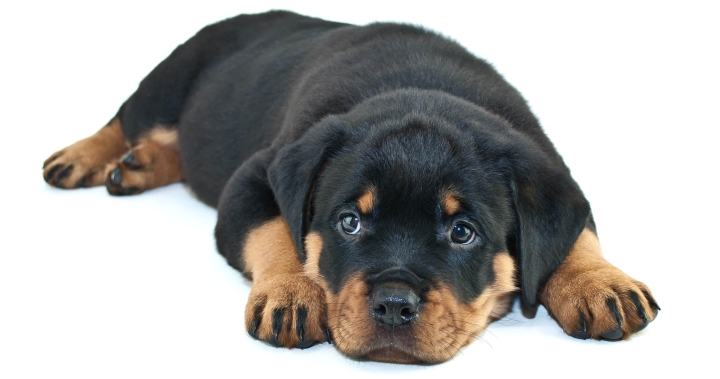
Rottweiler Health Problems & Picking Good Ingredients to Avoid Them
Osteochondritis Dissecans & Hip Dysplasia
Osteochondritis Dissecans is a health condition affecting the shoulder joints, and it’s a particular problem for Rottweilers because they grow so fast. In fact, most breeding associations for this breed have x-ray testing systems in place to watch out for it.
Plus, similar to lots of other big, active breeds, it’s also pretty common to see hip dysplasia in Rottweilers.
There are two things you can do to help prevent, treat, or ameliorate these problems. And mostly, you just want to promote steady growth and overall bone/joint health.
So, first, you want to avoid overfeeding. Steady meals with appropriate portions will keep puppies growing steadily and help keep adults from gaining weight.
Secondly, you want to include glucosamine in your dog’s diet, especially as he gets older. This is supplement found in lots of weird places (like Elk antlers), which contributes to joint health.
Cancer
No one really knows why, but Rottweilers seem to be especially susceptible to cancer. It’s one of the most common causes of early deaths for this breed.
And, of course, no one knows exactly what causes cancer. However, it’s still a good idea to make sure your pup has a really well-balanced diet rich in lots of produce and antioxidants.
Cancer is, of course, mostly a mystery, but this should help promote great overall health for your dog.
Getting Fat!
Rottweilers love to eat, and their owners (*cough* you *cough*…) usually love to feed them!
So it can be pretty easy for these guys to put on some pounds. And that can make some of their bone and joint problems worse.
To help your pup stay lean and healthy, the first thing you can do is make sure he’s eating the right amount of food (see above). Second, shoot for dog foods higher in protein and lower in simple carbohydrates. Third, make sure he gets plenty of exercise.
Allergies
This breed can also be prone to allergies and related tummy troubles.
To avoid (or, usually, to treat) this, your vet might recommend a hypoallergenic diet. If you want to nip this in the bud, stay away from commercial dog foods with a lot of fillers and opt for foods with fewer, whole ingredients.
Dig this post? We've got some more good info on dog food for Great Danes here. We've also got some good info on food for Dobermans.
**Disclaimer: Our dog food reviews are based mostly on (1) our expertise and that of the experts with whom we consult and (2) the information provided by the manufacturers. We do test many dog foods (with our dog's help), but we can't test them all. As such, please remember the above recommendations are our opinions, and you should consult your vet before making changes to your dog's diet.


